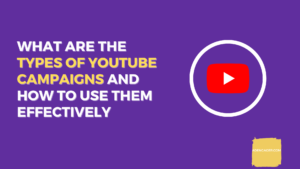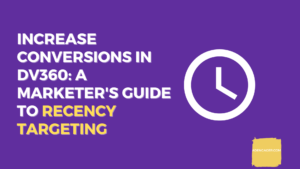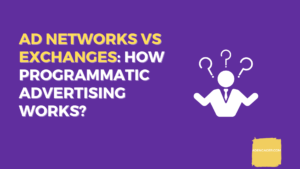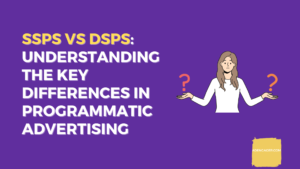The Complete Guide to Programmatic Deals: Everything You Need to Know
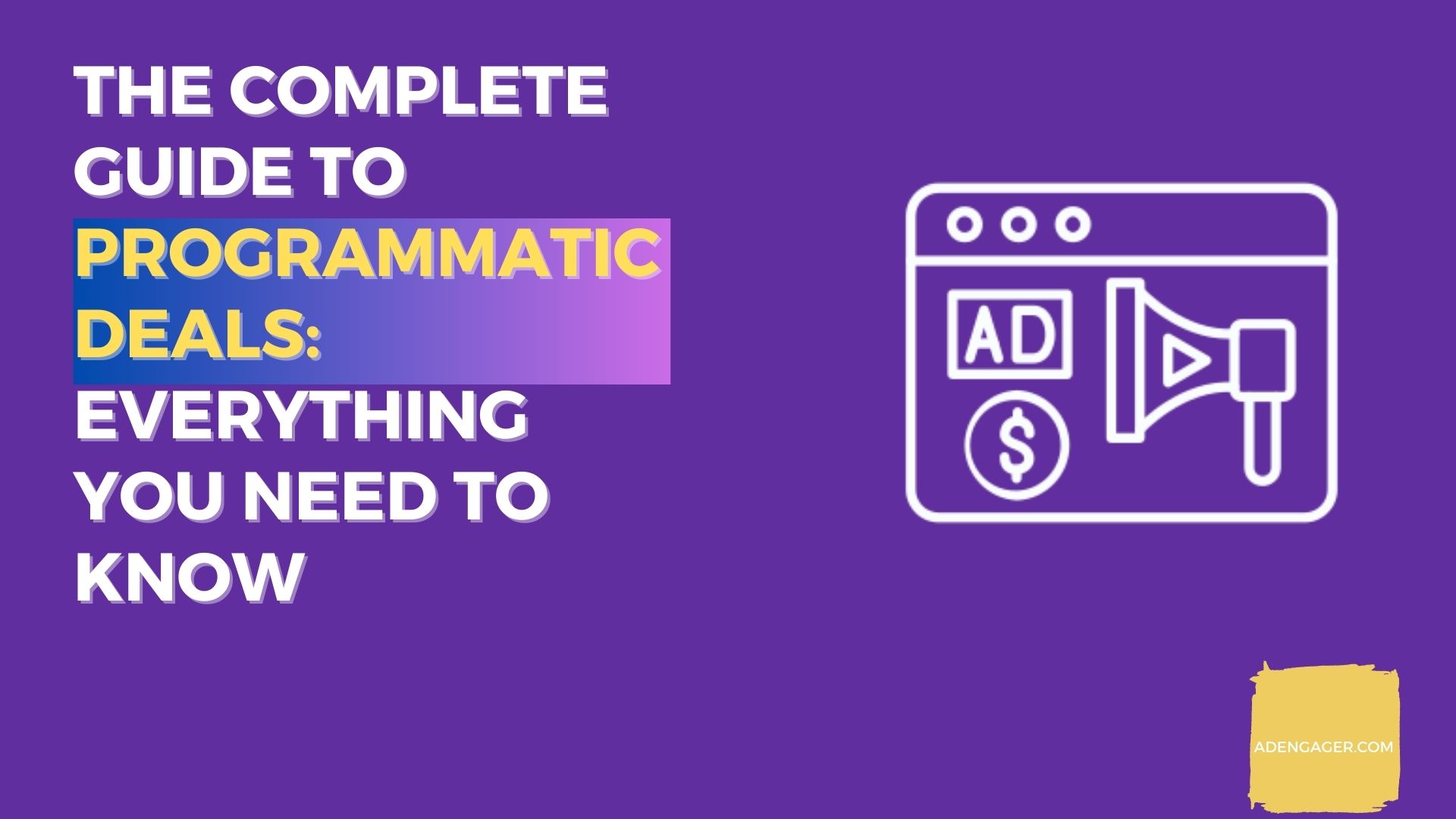
Welcome to my blog post on programmatic deals! In today’s digital advertising landscape, programmatic advertising has revolutionized the way advertisers like myself optimize ad spend and reach their target audience. Programmatic deals, in particular, offer a strategic approach to purchasing ad space in advance at a fixed price, providing greater control and access to high-quality websites. In this blog post, we’ll explore the different types of programmatic deals, their benefits, negotiation tactics, and performance tracking tips. Join me as we delve into the world of programmatic deals and discover how they can help you achieve your advertising goals efficiently and effectively.
What is programmatic advertising?
Programmatic advertising is a type of digital advertising that uses software to automate the buying and selling of ad space. This means that advertisers can buy ad space without having to manually negotiate with publishers. Programmatic advertising is based on real-time bidding (RTB), which means that advertisers bid on ad space in real time. The advertiser who bids the highest price wins the auction and their ad is displayed.
What are programmatic deals?
Programmatic deals are a type of programmatic advertising that allows advertisers to purchase ad space in advance at a fixed price. This gives advertisers more control over their ad spend and ensures that their ads are displayed on high-quality websites. There are different types of programmatic deals, including:
Open auction
As an advertiser, I can participate in an open auction to purchase ad space on a publisher’s website. In an open auction, all advertisers have the opportunity to bid on the same ad space. The advertiser who bids the highest price wins the auction and their ad is displayed.
Open auctions are the most common type of programmatic deal. They are a good option for advertisers who want to reach a wide audience and who are willing to pay a premium for ad space.
Private auction
A private auction is an auction that is only open to a select group of advertisers. This type of auction is often used by publishers who want to sell their ad space to premium advertisers.
As an advertiser, I can participate in a private auction if I am invited by the publisher. In a private auction, I can negotiate the price of ad space with the publisher. This gives me more control over my ad spend and ensures that my ads are displayed on high-quality websites.
Preferred deals
A preferred deal is a deal that is negotiated between an advertiser and a publisher. In a preferred deal, the advertiser agrees to purchase a certain amount of ad space from the publisher at a fixed price.
Preferred deals are a good option for advertisers who want to have more control over their ad spend and who want to ensure that their ads are displayed on high-quality websites.
Programmatic guaranteed
A programmatic guaranteed deal is a deal that guarantees that an advertiser will have their ads displayed a certain number of times. This type of deal is often used by advertisers who need to reach a specific audience.
As an advertiser, I can purchase a programmatic guaranteed deal if I am willing to pay a premium for ad space. This gives me the assurance that my ads will be seen by my target audience.
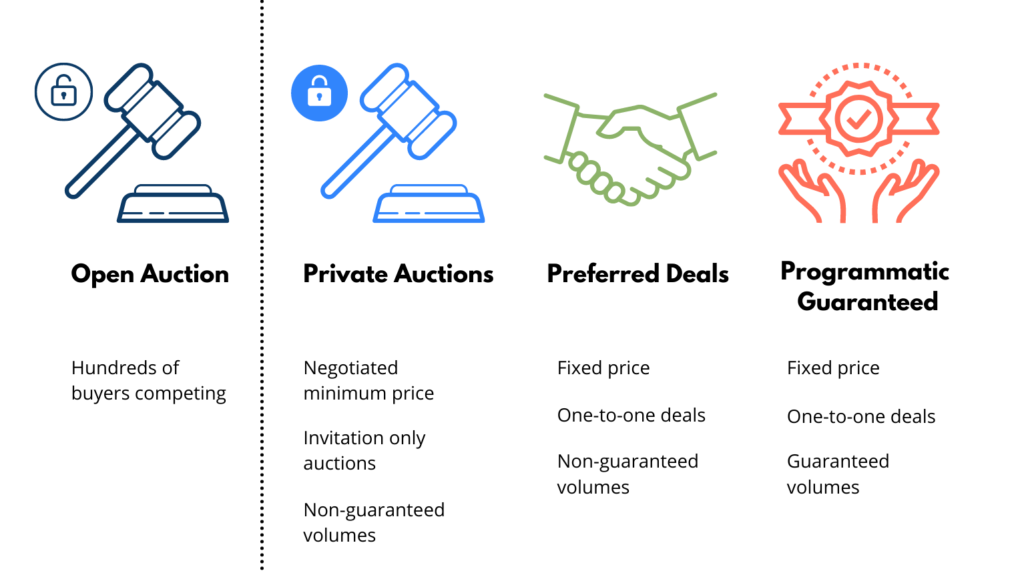
The Pros and Cons of Each Type of Programmatic Deal
Open auction
Advantages:
- Reach a wide audience
- Competitive prices
- Transparency
Disadvantages:
- No control over ad placement
- No guarantee of ad impressions
- High volatility of prices
Private auction
Advantages:
- More control over ad placement
- Guaranteed ad impressions
- More transparency
Disadvantages:
- Smaller pool of advertisers
- Higher prices
- Less flexibility
Preferred deals
Advantages:
- More control over ad placement
- Guaranteed ad impressions
- Competitive prices
Disadvantages:
- Less flexibility
- Not as transparent as open auctions
Programmatic guaranteed
Advantages:
- Guaranteed ad impressions
- High level of control
- More transparency
Disadvantages:
- Higher prices
- Less flexibility
- Not as competitive as open auctions
The best type of programmatic deal for you will depend on your specific needs and budget. If you are looking to reach a wide audience and are willing to pay a premium for ad space, then an open auction may be a good option for you. If you need more control over ad placement and guaranteed ad impressions, then a private auction or programmatic guaranteed deal may be a better option.
Why use programmatic deals?
There are several reasons why advertisers might use programmatic deals. These include:
- Control: Programmatic deals give advertisers more control over their ad spend. Advertisers can choose the websites where their ads are displayed and the price they are willing to pay.
- Reach: Programmatic deals can help advertisers reach a wider audience. Advertisers can use programmatic deals to target specific audiences or to reach a large number of people.
- Transparency: Programmatic deals are more transparent than traditional advertising methods. Advertisers can see how their ads are performing and they can track the ROI of their campaigns.
How Programmatic Deals Work
Programmatic deals, a type of programmatic advertising, operate by leveraging a software platform that automates the buying and selling of ad space. This platform serves as the intermediary, connecting advertisers and publishers, and enabling them to negotiate and finalize deals directly.
The process of executing a programmatic deal typically involves the following steps:
Identifying Target Publishers: Advertisers begin by identifying the publishers on which they wish to display their ads. These publishers are carefully selected based on factors such as their audience demographics, content relevance, and overall reputation.
Proposal Submission: Advertisers then submit a proposal to the chosen publishers. This proposal outlines the specific ad space they desire, the price they are willing to pay, and any targeting criteria they wish to apply. This may include factors like demographics, interests, location, or previous browsing behavior.
Publisher Review and Acceptance: The publisher reviews the proposal and assesses its suitability for their inventory. They evaluate factors such as the proposed price, compatibility with their audience, and the potential impact on user experience. Based on this assessment, the publisher can either accept the proposal, negotiate further terms, or reject it outright.
Finalization of the Deal: If the publisher accepts the proposal, the deal is finalized. At this point, the advertiser gains access to the agreed-upon ad space within the publisher’s inventory. The programmatic platform facilitates the transaction, ensuring that the ads are delivered as intended.
Programmatic deals encompass a wide range of ad formats, including display ads, video ads, and native ads. They also provide advanced targeting capabilities, enabling advertisers to tailor their campaigns to specific audience segments. This targeting can be based on factors such as age, gender, location, interests, browsing history, or even real-time bidding data.
Key players involved in programmatic deals (advertisers, publishers, ad exchanges)
Programmatic deals involve several key players that contribute to the successful execution of advertising campaigns. Let’s take a closer look at these players:
Advertisers: Advertisers are businesses or organizations that seek to promote their products or services. They utilize programmatic deals to purchase ad space on websites and apps, allowing them to reach their target audience effectively and drive desired outcomes.
Publishers: Publishers are the owners of websites and apps that offer ad space for monetization. They make their inventory available through programmatic deals, enabling advertisers to display their ads to the publisher’s audience. Publishers benefit from generating revenue through these ad placements.
Ad Exchanges: Ad exchanges act as intermediaries within the programmatic ecosystem. They facilitate the buying and selling of ad space by connecting advertisers and publishers. Ad exchanges provide a marketplace where advertisers can access available inventory from various publishers and make their ad placements.
Demand-Side Platforms (DSPs): DSPs are software platforms used by advertisers to manage programmatic advertising campaigns. They enable advertisers to efficiently purchase ad inventory across multiple publishers. DSPs provide tools for audience targeting, bidding, campaign optimization, and performance tracking.
Supply-Side Platforms (SSPs): SSPs are software platforms utilized by publishers to manage programmatic advertising campaigns. They help publishers optimize revenue by connecting their ad inventory with demand from advertisers. SSPs provide tools for inventory management, yield optimization, and real-time bidding.
Data Management Platforms (DMPs): DMPs play a crucial role in programmatic deals by collecting and analyzing user data. They aggregate and segment data from various sources to create valuable audience insights. DMPs enable advertisers and publishers to leverage data-driven targeting strategies and make informed decisions about their campaigns.
Ad Serving Companies: Ad serving companies facilitate the delivery of ads to users. They work closely with advertisers, publishers, and ad exchanges to ensure that ads are delivered correctly, according to targeting parameters and campaign specifications. Ad serving companies play a vital role in optimizing ad delivery and measuring campaign performance.
These key players collaborate within the programmatic ecosystem to enable efficient and targeted advertising. Advertisers benefit from increased control and reach, publishers can monetize their ad inventory effectively, and users receive relevant and engaging ad experiences. Programmatic deals have transformed the advertising landscape, providing a win-win situation for all stakeholders involved.
How to Track the Performance of Your Programmatic Deals
Tracking the performance of programmatic deals in DSP or SSP involves utilizing various metrics and tools to evaluate the effectiveness of your campaigns. Here are some methods to consider:
Reporting Tools: DSPs and SSPs often provide built-in reporting tools that offer insights into key performance metrics. These tools enable you to track impressions, clicks, CTR, conversion rate, CPM, CPC, and ROAS. By regularly reviewing these metrics, you can monitor the progress of your programmatic deals and identify areas for improvement.
Data Management Platforms (DMPs): DMPs play a crucial role in tracking the performance of programmatic deals. They collect and analyze user data, providing valuable insights into audience behavior and engagement. By leveraging DMP data, you can evaluate the effectiveness of your programmatic campaigns, understand how users interact with your ads, and refine your targeting strategies.
Third-Party Analytics Tools: In addition to the reporting tools offered by DSPs and SSPs, you can utilize third-party analytics platforms to gain deeper insights into your programmatic deals. These tools often offer advanced features and customization options for tracking and analyzing campaign performance. They can provide in-depth reporting, audience segmentation, cross-channel tracking, and attribution modeling, allowing you to make data-driven optimizations and measure the impact of your programmatic efforts more accurately.
Conversion Tracking: Implementing conversion tracking is crucial for assessing the success of programmatic deals. By tracking the actions users take after clicking on your ads, such as purchases or lead generation, you can calculate conversion rates and understand the ROI of your campaigns. Conversion tracking can be achieved through pixels, tags, or integration with third-party tracking systems.
A/B Testing: A/B testing involves running multiple versions of your programmatic ads to determine which performs better. By comparing different ad creatives, formats, messaging, or targeting strategies, you can identify the most effective approach for driving engagement and conversions. A/B testing allows you to iterate and optimize your programmatic deals based on data-driven insights.
Regularly monitoring and analyzing the performance metrics mentioned above will enable you to make informed decisions and optimize your programmatic deals for better results. By tracking impressions, clicks, conversions, costs, and ROI, you can refine your targeting, creative, and bidding strategies to enhance campaign effectiveness and maximize your advertising goals.
Here are some additional tips for tracking the performance of programmatic deals:
As an advertiser, I have learned some additional tips for effectively tracking the performance of programmatic deals. Here are some valuable insights:
First and foremost, setting clear goals is crucial. By defining specific objectives for your programmatic campaigns, such as increasing brand awareness, generating leads, or driving sales, you can align your tracking efforts accordingly. Regularly monitoring the performance metrics allows you to gauge whether you are making progress towards your goals.
When tracking the performance of programmatic deals, it’s important to focus on the right metrics. Not all metrics carry equal weight in assessing success. For instance, if your primary objective is lead generation, the conversion rate holds more significance than the click-through rate (CTR). Understand which metrics align with your goals and prioritize tracking them.
Diversify your tracking tools. Relying on a single tracking tool may provide limited insights. Consider utilizing multiple tools to gain a comprehensive understanding of your programmatic campaigns’ performance. Combining the reporting capabilities of your DSP or SSP with third-party analytics platforms can provide a more holistic view of key metrics and allow for deeper analysis.
Regularly reviewing your reports is essential. Consistently monitoring your programmatic campaign reports enables you to stay informed about their performance. By doing so, you can identify any issues or areas for improvement early on and make timely adjustments. Regular reports help you stay on top of your campaigns and ensure they are on the right track towards meeting your objectives.
By following these tips, you can effectively track the performance of your programmatic deals. Remember to establish clear goals, track relevant metrics, leverage multiple tracking tools, and review reports regularly. These practices will provide valuable insights and enable you to make data-driven decisions to optimize your programmatic campaigns and achieve the desired outcomes.
The Challenges and Considerations of Programmatic Deals
As someone interested in programmatic deals, I understand that there are various challenges and considerations to navigate. Let’s explore some of the common challenges:
Transparency can be a hurdle within the complex programmatic ecosystem. Tracking the performance of your ads and ensuring they reach the intended audience while achieving a satisfactory return on investment can be a challenge.
Ad fraud poses a significant concern. Fraudulent activities can generate clicks or impressions without the user’s knowledge or consent, leading to wasted ad spend and potential damage to your brand reputation.
Brand safety is another important consideration. With programmatic deals, your ads may appear on websites or apps that do not align with your brand’s values. This can negatively impact your brand reputation and result in lost customers.
Data privacy is a crucial aspect to address. While programmatic deals rely on user data for effective targeting, it’s important to be mindful of privacy implications and ensure compliance with data protection regulations.
In addition to these challenges, there are other key considerations to keep in mind:
Cost is a factor to consider, as programmatic deals may involve higher expenses compared to traditional advertising methods. This is due to paying for guaranteed ad impressions or clicks.
The complexity of programmatic deals can be daunting, as multiple players are involved in the ecosystem. Negotiating and managing these deals require a solid understanding of the programmatic landscape and its various tools.
Technical skills are necessary for successful programmatic deal execution. Familiarity with the programmatic ecosystem and its tools is essential for effective negotiation and management.
To overcome these challenges and considerations, consider the following tips:
Choose partners wisely. Select partners who understand your brand and target audience, and who can assist in tracking performance and optimizing your campaigns.
Utilize appropriate tracking tools. Employ tools that aid in monitoring the performance of your programmatic deals, enabling you to identify and address issues promptly.
Transparency is key. Be open and transparent with your customers regarding how their data is used. This fosters trust and helps mitigate privacy concerns.
Conduct thorough research. Before launching any programmatic deals, conduct comprehensive research to understand the programmatic ecosystem and available tools, ensuring informed decision-making.
By implementing these strategies, you can overcome the challenges associated with programmatic deals and effectively achieve your marketing goals.
The Future of Programmatic Deals: What to Expect in the Years to Come
The future of programmatic deals holds great promise. As the programmatic ecosystem undergoes constant evolution, several trends are expected to shape its future landscape.
One prominent trend is the growing emphasis on data-driven targeting. Advertisers are becoming increasingly sophisticated in their use of data, enabling them to target ads with greater precision. This advancement will not only yield improved outcomes for advertisers but also enhance the user experience.
Another significant trend revolves around the rising significance of privacy. Users are becoming more aware of the privacy implications associated with programmatic advertising. In response, advertisers are compelled to find ways to target ads while respecting user privacy. This will foster the development of new privacy-friendly targeting solutions.
Additionally, the surge of programmatic guaranteed deals is poised to play a pivotal role in the future of programmatic deals. Advertisers seek greater control over their ad spend and assurance that their ads will be displayed a specific number of times. The popularity of programmatic guaranteed deals is expected to rise as advertisers yearn for increased certainty in their advertising campaigns.
In summary, the future of programmatic deals appears bright and promising. The ever-evolving programmatic ecosystem will be influenced by these trends, resulting in improved outcomes for advertisers, an enhanced user experience, and a more privacy-conscious programmatic environment.
Resources for learning more about programmatic deals
If you’re looking to expand your knowledge about programmatic deals, there are numerous resources at your disposal. Here are some of the most popular options:
The Interactive Advertising Bureau (IAB): As a trade association representing the digital advertising industry, the IAB offers a range of resources on programmatic deals. Their website provides access to white papers, webinars, and case studies that delve into the topic.
The Association of National Advertisers (ANA): The ANA, another prominent trade association in the advertising industry, also provides valuable resources on programmatic deals. Their collection of white papers, webinars, and case studies can offer insights into various aspects of programmatic advertising.
AdExchanger: As a media news website specializing in programmatic advertising, AdExchanger features a wealth of articles and blog posts dedicated to programmatic deals. Exploring their content can help you stay informed about the latest trends and developments in the industry.
Programmatic Advertising World: This conference focuses on the programmatic advertising industry and serves as an excellent platform to learn about programmatic deals. The event features presentations from industry experts and showcases case studies from leading brands, providing valuable real-world insights.
The Programmatic Think Tank: The Programmatic Think Tank is a reputable blog covering all facets of the programmatic advertising industry. It offers articles on programmatic deals, technology, and best practices, making it a valuable resource for expanding your knowledge.
These resources represent just a few examples of the wealth of information available to learn more about programmatic deals. By leveraging these opportunities, you can deepen your understanding of programmatic advertising and discover how it can benefit your business.

